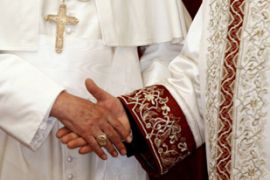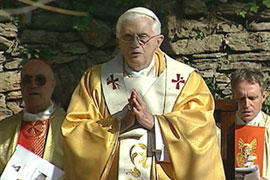Turks make peace with the Pope
Reaction to pontiff’s visit to Turkey far less negative than originally feared.

|
Only two months ago the recently elected pontiff managed to cause furore in the Islamic world with a remark made in a speech in Germany in which he appeared to claim that Islam was a religion of violence and barbarism |
What had been billed as a major demonstration against the visit, organised in central Istanbul on Sunday by the ultra-Islamic Saadet political party, managed to attract only 25,000 participants.
This was a tiny number given the city’s population of more than 14 million, and the fact that Saadet had bussed in supporters from other cities.
And with the majority of placards carrying anti-Christian slogans written in English, the widely voiced criticism has been that it was aimed less at rallying opposition to the papal visit as putting on a show for the visiting international media, which was only too ready to publish photographs of angry Turks protesting.
Media response
By stark contrast, coverage of the papal visit in the Turkish media has been surprisingly positive and the little criticism that has emerged, is surprisingly muted.
With the big selling secular dailies having long advertised the visit as an opportunity for bridge-building between the Islamic and Christian worlds and a chance for Turkey to improve its international reputation, the only significant criticism has come from the more extreme Islamic media.
Milli Gazete, daily a staunch supporter of the Saadet Party, chose to lead its coverage of the pope’s arrival and meeting with Turkish prime minister Recep Tayip Erdogan with claims of a disagreement between the two as to whether Turkey’s population was 95% or 99% Muslim – a claim not reported elsewhere.
Radical Islamist daily Vakit, traditionally the most strident in criticism of Western and Christian values, opted for once to avoid controversy, choosing instead to point out that while being greeted last night at the presidential palace by Turkish president Ahmet Necdet Sezer, Benedict XVI was allowed to wear his traditional religious robes and cross, a concession not offered to wearers of Islamic traditional dress who are barred from entry to both the presidential palace and the Turkish parliament.
Religious peace
The mainstream Islamic media however, in common with its secular counterpart, chose to take a positive view of the papal visit, with big-selling dailies Zaman and Yeni Safak both leading with the pope’s message of support for Turkey’s EU membership, and his call for peace between Islam and Christianity.
Yeni Safak went so far as to claim that by wearing a plain overcoat with no visible cross when alighting from his aircraft, Benedict XVI had made an important gesture towards his Muslim hosts.
 |
|
Pope Benedict XVI celebrates mass in Selcuk |
But while the media has for the most part been broadly supportive of the papal visit, among ordinary Turks awaiting his arrival in Turkey’s main city of Istanbul there was a distinct ambivalence, with many questioning why, after making such a pointed criticism of Islam as recently as September, he was so keen to visit Turkey.
“I’m not against his visit, but if he really believed the things he said, then I have to wonder why he chose to come here,” said Eren Karabuk, breaking off from offering traditional prayers outside an Islamic shrine in the devout Istanbul suburb of Fatih.
“After the things he said I really didn’t want him to come here,” echoed Ali Kirklareli, a flower seller in Istanbul’s main Taksim square. “I think this visit is just a media show, he wants to pretend he has made peace with the Islamic world. But even so, I’ll be happy if the visit passes without incident.”
Turkish hospitality
But others were more welcoming, happy to take the opportunity to display Turkey’s famed hospitality and to offer the pontiff the occasion to atone for his remarks.
“He’s visiting Turkey so he is our guest,” said the owner of the adjacent flower stall, Hediye Ozturk. “Even after what he said, if he wants to visit my house I’d be very happy to receive him.”
“He’s old,” said Selim Sen, a bearded shopkeeper in Istanbul’s former European quarter of Beyoglu.
“Sometimes old people get confused and say things they don’t mean. If he’s visiting us in a spirit of friendship, that’s good enough for me.”
Others too were keen to emphasise that the papal visit was the perfect opportunity to heal wounds.
Visit has benefits
“I think his visit here will be of benefit to our relations with the Christian world,” said Zafer Karanfil, an Istanbul shopkeeper of Arabic origin who claims descent from the tribe of Prophet Muhammad.
“He’s the head of a Christian church and we should treat him with respect,” he said quoting the 24th century Sufi Islamic mystic, Mevlana – “If god loves you, I should love you too.”
“I’m a good Muslim,” Kerem Aydin, a taxi driver, said. “I pray five times a day and my wife wears a headscarf, but I don’t have any bad feelings towards Christians – why should I?”
“I don’t even blame him for this,” he said, throwing up his arms in despair as police moved to block off a main road prior to Benedict XVI’s arrival, causing a lengthy tailback.
“If it wasn’t the Pope causing a tailback, it would be something else. This is Istanbul, the traffic’s always terrible.”